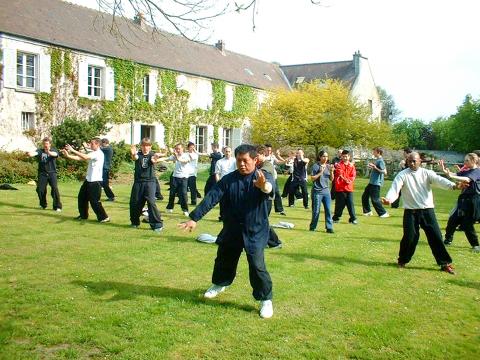Martial arts master and special forces combat trainer Liu Chang-i (劉長益) said he hopes to introduce the feeding crane style to the world as Taiwan’s distinctive martial arts form.
Liu, 55, has mastered the style and is a combat instructor for the army’s, marines’ and military police’s special service companies.
The companies last year jointly demonstrated their feeding crane-inspired hand-to-hand combat techniques at the Double Ten National Day ceremony, which Liu said made him proud.

Photo: Huang Hsu-lei, Taipei Times
The style’s emphasis on fast and deadly blows makes it suitable for military applications, where soldiers have to defeat the enemy quickly, Liu said.
“It was originally a fighting style for women. The point is to defeat the opponent immediately by using explosive power and striking at vital points, as women cannot win protracted struggles with men,” he said.
The style is said to have been created 400 years ago by Fang Qiniang (方七娘), who modified the Chinese white crane style for women’s self-defense, Liu said.
Fang’s system has four main traditions — the flying crane, singing crane, resting crane and feeding crane styles, the last of which was brought to Taiwan by Master Lin Te-shun (林德順) in 1927, he said.
Lin taught the feeding crane style to Liu’s grandfather and after that the title of the master passed from father to son, he said.
Learning the style at a young age, Liu said he began helping his father with teaching it from the age of 14 and started teaching his own classes when he was 21.
At the age of 32, Liu established a feeding crane style school in the US and he has since opened schools in Romania, Germany, Spain and France, he said, adding that he travels the world to teach the style.
Every Asian nation and culture around Taiwan has laid claim to a signature martial art, such as taichi, wing chun, karate, taekwondo, Muay Thai and escrima, he said.
“It is a shame that Taiwan does not have a representative martial art,” he said. “I want to leave behind something for the nation. I have vowed that I will travel to make the feeding crane style thrive all over the world,” he said.

Chinese Nationalist Party (KMT) Chairman Eric Chu (朱立倫), spokeswoman Yang Chih-yu (楊智伃) and Legislator Hsieh Lung-chieh (謝龍介) would be summoned by police for questioning for leading an illegal assembly on Thursday evening last week, Minister of the Interior Liu Shyh-fang (劉世芳) said today. The three KMT officials led an assembly outside the Taipei City Prosecutors’ Office, a restricted area where public assembly is not allowed, protesting the questioning of several KMT staff and searches of KMT headquarters and offices in a recall petition forgery case. Chu, Yang and Hsieh are all suspected of contravening the Assembly and Parade Act (集會遊行法) by holding

PRAISE: Japanese visitor Takashi Kubota said the Taiwanese temple architecture images showcased in the AI Art Gallery were the most impressive displays he saw Taiwan does not have an official pavilion at the World Expo in Osaka, Japan, because of its diplomatic predicament, but the government-backed Tech World pavilion is drawing interest with its unique recreations of works by Taiwanese artists. The pavilion features an artificial intelligence (AI)-based art gallery showcasing works of famous Taiwanese artists from the Japanese colonial period using innovative technologies. Among its main simulated displays are Eastern gouache paintings by Chen Chin (陳進), Lin Yu-shan (林玉山) and Kuo Hsueh-hu (郭雪湖), who were the three young Taiwanese painters selected for the East Asian Painting exhibition in 1927. Gouache is a water-based

Taiwan would welcome the return of Honduras as a diplomatic ally if its next president decides to make such a move, Minister of Foreign Affairs Lin Chia-lung (林佳龍) said yesterday. “Of course, we would welcome Honduras if they want to restore diplomatic ties with Taiwan after their elections,” Lin said at a meeting of the legislature’s Foreign Affairs and National Defense Committee, when asked to comment on statements made by two of the three Honduran presidential candidates during the presidential campaign in the Central American country. Taiwan is paying close attention to the region as a whole in the wake of a

OFF-TARGET: More than 30,000 participants were expected to take part in the Games next month, but only 6,550 foreign and 19,400 Taiwanese athletes have registered Taipei city councilors yesterday blasted the organizers of next month’s World Masters Games over sudden timetable and venue changes, which they said have caused thousands of participants to back out of the international sporting event, among other organizational issues. They also cited visa delays and political interference by China as reasons many foreign athletes are requesting refunds for the event, to be held from May 17 to 30. Jointly organized by the Taipei and New Taipei City governments, the games have been rocked by numerous controversies since preparations began in 2020. Taipei City Councilor Lin Yen-feng (林延鳳) said yesterday that new measures by